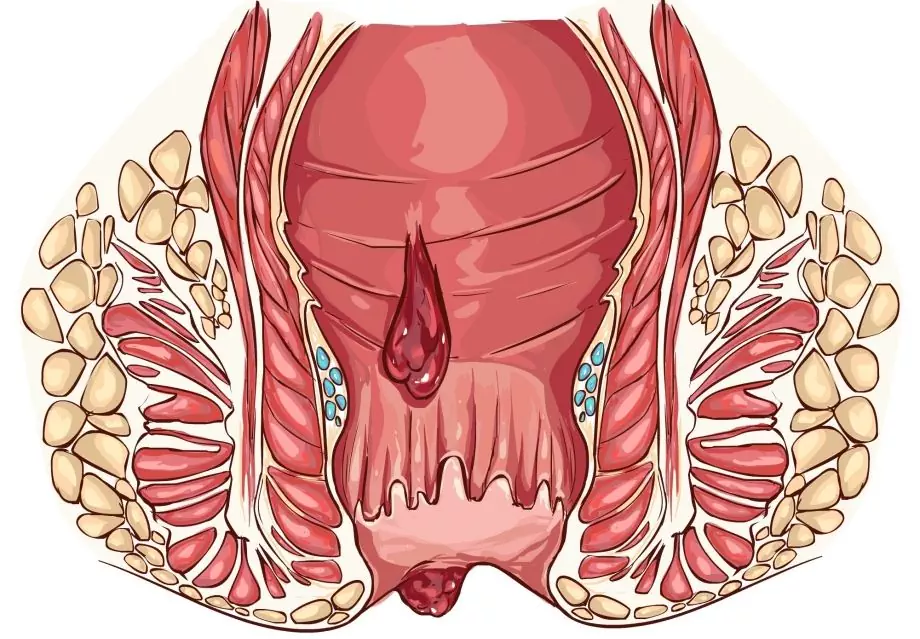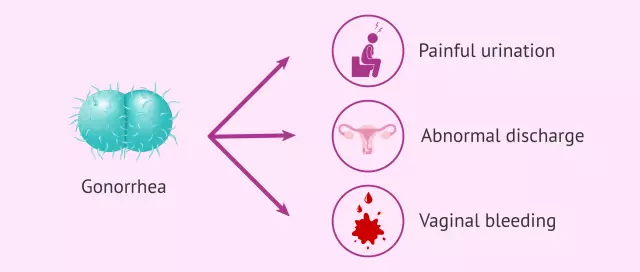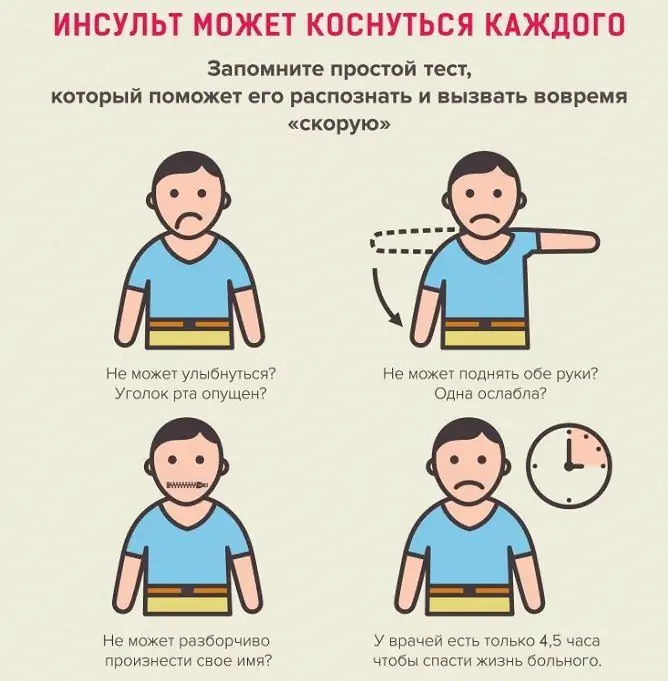- Author Rachel Wainwright [email protected].
- Public 2024-01-15 19:51.
- Last modified 2025-11-02 20:14.
Menopause in women
The content of the article:
- What it is
- How menopause begins
- Menopause in women: symptoms
-
Menopause in women: treatment
- General Provisions
- Symptomatic treatment
- Hormone replacement therapy
- Video
Menopause is a natural period in a woman's life, which is caused by the extinction of the hormone-producing function of the ovaries. Menopause in women occurs on average at the age of 45-55 years. The onset of menopause can be difficult for women, which is associated with the occurrence of a number of unpleasant symptoms - hot flashes, mood swings, dryness in the vagina, decreased skin elasticity. It is possible to alleviate the condition with the help of diet, taking herbal preparations and hormone replacement therapy.

One of the most common symptoms of menopause is flushing.
What it is
Menopause is a physiological process in a woman's life that begins after the last menstrual period.
During reproductive age, the ovaries produce sex hormones: estrogens, progestins and weak androgens. Estrogens affect not only the female genital organs, but also the brain, cardiovascular system, and bones. How estrogens work:
- cause proliferation of the endometrium (regulation of the menstrual cycle);
- stimulate the growth and regeneration of the epithelium of the urogenital tract;
- affect the central nervous system - normalize mood, stimulate cognitive functions;
- improve the state of the vascular endothelium, reduce blood pressure;
- increase blood clotting;
- reduce the leaching of calcium from the bones, contribute to their strengthening.
During menopause, the production of estrogen by the ovaries gradually decreases, and then completely stops, which is the cause of the climacteric syndrome. All estrogen-dependent organs - uterus, urogenital tract, central nervous system, heart and blood vessels, skeletal system - suffer from estrogen deficiency.
How menopause begins
In most cases, the cessation of menstrual function occurs at the age of 45-55 years, in which case menopause is called timely. Also distinguish between premature, early and late menopause.
| Menopause type | Date of occurrence |
| Premature | under 40 |
| Early | 40-45 years old |
| Timely | 45-55 years old |
| Late | over 55 years old |
The onset of menopause is gradual, in the process there are 3 periods:
- The period of the menopausal transition. The transition stage is characterized by a change in the duration of menstrual cycles. During this period, the production of sex hormones decreases, and the female body tries to adapt to these changes. At this stage, the first manifestations of climacteric syndrome may occur.
- Menopause. The menopausal period, beginning with the onset of the last menstrual period, lasts 12 months and is characterized by the complete extinction of the hormonal function of the ovaries.
- Postmenopause. The postmenopausal period begins 1 year after the last menstrual period and lasts until the end of life.
Menopause in women: symptoms
All symptoms that appear with menopause are associated with estrogen deficiency. Early manifestations of menopause include vasomotor symptoms and mood swings. In a later period, urogenital disorders, pathologies of the heart, osteoporosis of bones appear.
| Time of appearance | Symptom group | Explanation |
| Early | Vasomotor symptoms | Vasomotor symptoms are the most common and early signs of menopause and are associated with vasodilation. These include hot flashes, facial flushing, dizziness, and excessive sweating. |
| Psycho-emotional disorders |
Estrogen deficiency affects the state of the central nervous system, which is manifested by the following symptoms: · Emotional lability (sudden mood swings); Tearfulness; · Depressive manifestations; · Cognitive impairment - memory impairment, decreased concentration. |
|
| Late | Urogenital disorders |
The mucous membrane of the urogenital tract is very sensitive to estrogen, therefore, with menopause, the following symptoms often occur: Itching; Dryness of the mucous membrane; · Painful sensations; · Bleeding. Urinary incontinence and organ prolapse can also develop, these symptoms are associated with weakness of the pelvic floor muscles. |
| Heart pathology |
Estrogens are cardioprotective, so their deficiency significantly affects the state of the cardiovascular system. What symptoms from the heart can develop with menopause: Tachycardia; · arterial hypertension; · headache. In a later period, the risk of lipid deposition on the walls of blood vessels increases, which is manifested by symptoms of atherosclerosis. |
|
| Osteoporosis |
Deficiency of estrogen significantly affects calcium-phosphorus metabolism, which is manifested by changes in the bone tissue. What happens to the bone tissue during menopause: · Calcium is washed out from bones; · The fragility of bone tissue increases, osteoporosis can develop; · A decrease in bone density leads to frequent fractures. |
Menopause in women: treatment
Menopause is a physiological process; it is impossible to artificially restore the production of hormones by the ovaries. However, it is possible to alleviate the course of this period by using symptomatic treatment and hormone replacement therapy.
General Provisions
Dieting can help relieve the symptoms of menopause. Basic nutritional principles:
- plentiful drink - you can drink plain water, green tea, herbal teas, fruit drinks and juices;
- limiting salt and foods high in salt;
- consumption of foods that contain natural estrogens - beans, chickpeas, green peas, lentils, apricots.
To facilitate the course of menopause, folk recipes based on medicinal herbs that contain phytoestrogens will help. To prepare broths and infusions, you can use sage, hops, flax seeds, linden and chamomile flowers (pictured), licorice root and ginseng. In addition, physical activity, good sleep and rest will help the body adapt to new conditions.

Linden and chamomile tea may help alleviate some of the symptoms of menopause
Symptomatic treatment
Treatment for menopause is mainly aimed at eliminating unpleasant symptoms. Medicines are selected individually, the choice of therapy is based on clinical symptoms.
| Symptom group | How to treat |
| Psycho-emotional disorders |
Antidepressants are prescribed to treat psychoemotional disorders (especially depression) and to relieve vasomotor symptoms. Preference is given to selective serotonin reuptake inhibitors (SSRIs): Fluoxetine; Sertraline; · Citalopram; · Escitalopram; Paroxetine. |
| Urogenital disorders |
To reduce symptoms from the urogenital tract, local hormonal therapy is used - vaginal administration of estrogens in the form of suppositories or cream. What drugs can be used: · Vaginal suppositories and Ovestin cream; · Divigel gel; · Estrogel gel. |
| Osteoporosis |
For the treatment of postmenopausal osteoporosis, bisphosphonates are prescribed. Bisphosphonates are bone resorption inhibitors. They prevent the development of osteoporosis and frequent fractures. What drugs are prescribed: Alendronic acid (Alendronate, Ostalon, Tevanat); Zoledronic acid (Zometa, Zolerix, Rezorba); Risedronic acid (Actonel, Rizendros); · Combined drugs - Fosavance, Tevabon. Calcium and vitamin D supplements are also used to reduce the risk of fractures. |
Hormone replacement therapy
The most effective way to get rid of the symptoms of menopause is hormone replacement therapy (HRT). Such treatment compensates for the estrogen deficiency, which makes it possible to alleviate the pathological course of menopause.
For HRT, drugs containing only estrogens or combined drugs (estrogens and gestagens) can be used. Monotherapy with estrogen is prescribed for artificial menopause, when the symptoms of menopause have arisen as a result of the removal of the uterus with appendages. For estrogen monotherapy, Ovestin, Proginova, Estrofem can be prescribed.

Proginova is one of the hormone replacement therapy drugs for menopause
Combined drugs that contain estrogens and gestagens are divided into monophasic, biphasic and three-phase:
- two-phase and three-phase drugs (Femoston, Klimonorm, Divina, Cyclo-Proginova) are prescribed to women in the early period of menopause;
- monophasic (Kliogest, Premella) - not earlier than one year after the cessation of menstruation.
Despite its high efficiency, HRT is not prescribed for all women during menopause. The fact is that prolonged use of estrogen-containing drugs can lead to dangerous consequences - the risk of thrombotic complications, endometrial and breast cancer increases.
Video
We offer for viewing a video on the topic of the article.

Anna Kozlova Medical journalist About the author
Education: Rostov State Medical University, specialty "General Medicine".
The information is generalized and provided for informational purposes only. At the first sign of illness, see your doctor. Self-medication is hazardous to health!






